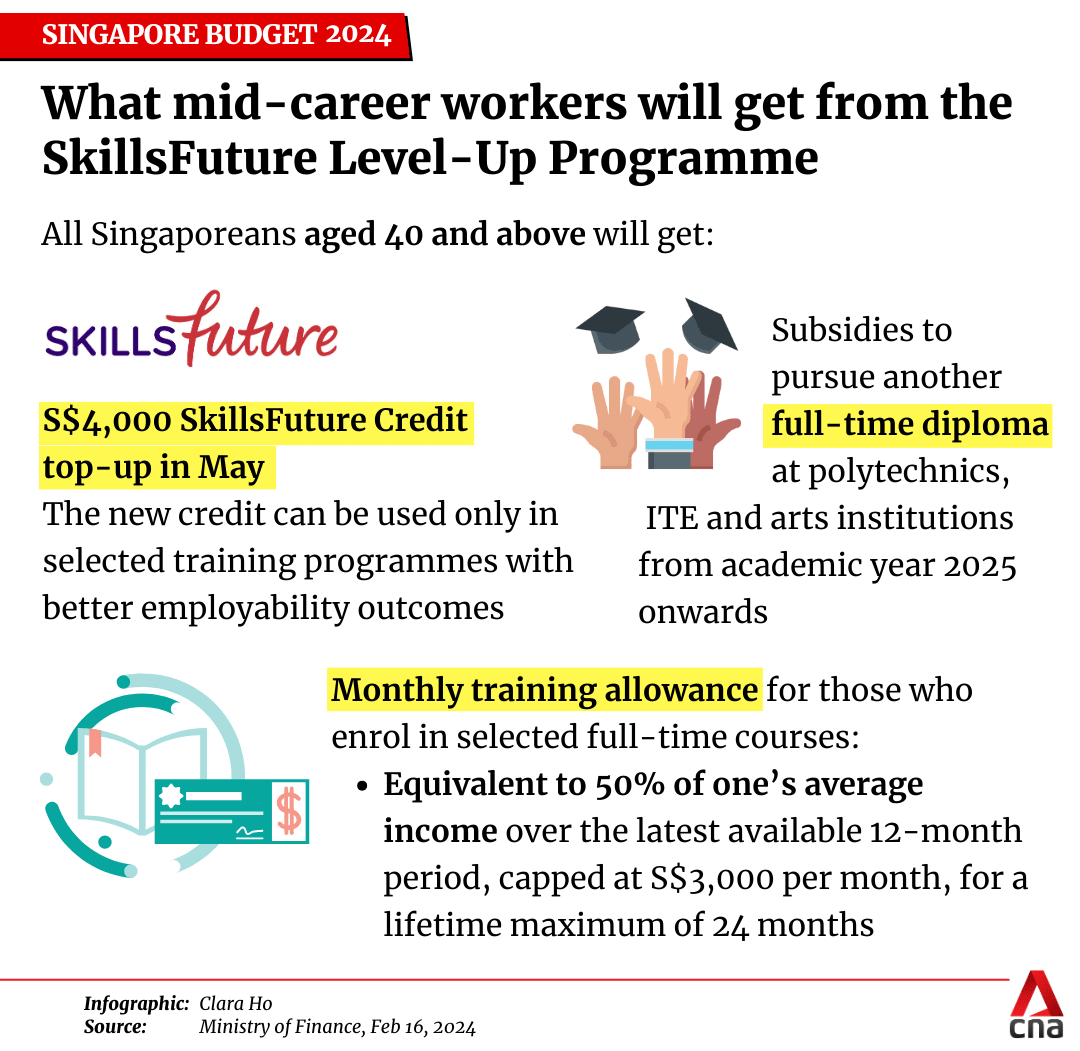S$4,000 SkillsFuture top-up will push workers to upskill, but employers' support is key: HR experts
The SkillsFuture top-up, announced in Budget 2024, will be credited to Singaporeans aged 40 and above in May.

A lunchtime crowd is seen at Raffles Place in Singapore on Feb 16, 2023. (File photo: AFP/Roslan Rahman)

This audio is generated by an AI tool.
SINGAPORE: A significant boost to the SkillsFuture scheme announced in Budget 2024 will likely push mid-career workers already thinking about upskilling to take the plunge, said human resource experts.
While the move will benefit those who were held back by cost, their participation in these programmes will depend on whether they have support from their employers, they added.
“It is a pretty powerful signal to this group of mid-careers that they should start thinking seriously about proactively investing their time and effort in reskilling or upskilling,” said Associate Professor Kang Yang Trevor Yu of the Nanyang Business School at Nanyang Technological University.
The SkillsFuture scheme provides credits for workers to retrain or upskill by taking courses. All Singaporeans aged 25 and above received S$500 (US$370) credit in 2015 when the programme was launched.
In his Budget 2024 speech on Friday (Feb 16), Deputy Prime Minister Lawrence Wong said Singaporeans aged 40 and above will receive an additional S$4,000 SkillsFuture credit in May. Younger Singaporeans will receive the same amount when they turn 40.
This top-up can only be used for selected training courses, including part-time and full-time diploma, post-diploma and undergraduate programmes, as well as courses in the Progressive Wage Model sectors such as retail, security and cleaning.
The large boost to SkillsFuture will certainly garner attention and prompt Singaporeans to consider if they should use their credits, said Ms Jaya Dass, Asia-Pacific managing director of Randstad.
“If the government is giving me this much money in some shape, size or form, it must be for something that is significantly useful to me,” she added.
The S$4,000 will be particularly helpful for those changing jobs, looking to further their careers or transitioning to new roles, said Dr Xu Le with the National University of Singapore’s (NUS) business school.
Since the courses will be selected by the government, they will reflect the most needed skills in the job market, she added.
For example, most workers are facing digital transformation challenges, including processing and analysing data. This is why many courses eligible for the SkillsFuture programme are focused on data processing and digital transformation, said Dr Xu.
Monetary incentives are effective in motivating about two-thirds of adult learners, said Ngee Ann Polytechnic’s Dr Christy Chung, adding that these learners typically look for programmes with better employment outcomes.
“These measures have been crafted to be comprehensive, catering to a wide range of workers including rank-and-file employees, PMETs (professionals, managers, executives and technicians) looking to upskill or reskill, as well as platform workers, gig economy participants and returning mothers aiming to broaden their skill sets or explore new job opportunities,” said Dr Chung, the director of the polytechnic's Continuing Education & Training Academy.
Heart of the Matter: Is Budget 2024 a blueprint for a new Singapore?
SUPPORT FOR RETRENCHED WORKERS
On top of the S$4,000 credit, Singaporeans aged 40 and above will also receive subsidies to pursue a full-time diploma at polytechnics, the Institute of Technical Education and arts institutions from the 2025 academic year, Mr Wong announced on Friday.
Those who enrol in selected full-time courses will also receive monthly training allowances equivalent to 50 per cent of their average income over the latest available 12-month period, capped at S$3,000 per month.
Each person can receive up to 24 months of training allowance throughout their lifetime, which can cover the full duration of a SkillsFuture career transition programme and more than half the duration of most qualifications issued by institutes of higher learning.
These measures are catered to workers who have been laid off, said Randstand's Ms Dass.
Last year, retrenchments in Singapore more than doubled to 14,320. The tech industry here has also seen mass layoffs among large firms such as Facebook parent Meta, Twitter, Shopee and Lazada.
Amid slower economic growth, retrenched workers often remain jobless longer as manpower demand is lower, Ms Dass said, adding that those unable to find employment can benefit from the new measures by opting for a full-time course.
Some workers may also decide to change industries or do something different, seeing retrenchment as a “second go” or an opportunity for a career switch, she said.
“It may be an intentional pause on their part, because the money required to upskill yourself and educate yourself is being provided by the government. So there’s very little reason to say that even if I wanted to educate myself and upgrade myself, I don’t have the funds to do so.”

SUPPORT FROM EMPLOYERS
Since the S$4,000 top-up can also be used for part-time courses, support from employers is key for workers pursuing these accreditations, HR experts said.
Some employers may not want their employees to pursue courses because the company does not directly benefit from the training. If employees have to sacrifice promotions or a higher salary, they are also unlikely to want to take courses.
“A reskilled or upskilled worker may subsequently seek better job opportunities elsewhere,” said NUS' Dr Xu.
Having employees away on training will pose challenges to companies, especially smaller ones.
“SMEs (small- and medium-size enterprises) would say it’s a good-to-have, but not a must-have,” said Ms Jasmine Liew, founder of Breakthrough Catalyst, an organisational development consultancy.
“Even short courses are already an issue, if I let you attend (courses) for one year, two years, then who’s going to do your job?”
But from a staff engagement and retention perspective, allowing employees to develop their careers may encourage them to stay with the company, she said.
“Doing a course for two years doesn’t mean pulling out of the organisation and being out of touch. There could be certain short attachments during the holidays to give back, or even help the existing employees, come back and teach people.”
In recent years, there has been a noticeable shift in organisational training strategies towards greater flexibility, said Ngee Ann Polytechnic's Dr Chung.
“Companies are increasingly willing to explore options like reduced workloads or study leave to support part-time learning among their employees. With talent retention being a pressing concern, many employers recognise the importance of upskilling their workforce to facilitate career progression.”
Instead of a complete break from work, employers may consider offering flexible work arrangements such as reduced hours or adjusted schedules.
Employers already support younger workers in work-study programmes, so there is potential for companies to extend similar support to mid-career workers, Dr Chung said.


















